Home Tags Posts tagged with "China"
China
Beijing has denounced the US charges against five Chinese army officers accused of economic cyber-espionage.
China says the US is also guilty of spying on other countries, including China, and accuses the US of hypocrisy and “double standards”.
US ambassador in Beijing has been summoned over the incident. China says relations will be damaged.
US prosecutors say the Chinese officers stole trade secrets and internal documents from five companies and a labor union.
China’s defense ministry put out a strongly-worded statement on its website on Tuesday saying that China’s government and its military “had never engaged in any cyber espionage activities”.
It also took aim at the US, saying: “For a long time, the US has possessed the technology and essential infrastructure needed to conduct large-scale systematic cyber thefts and surveillance on foreign government leaders, businesses and individuals. This is a fact which the whole world knows.
“The US’ deceitful nature and its practice of double standards when it comes to cyber security have long been exposed, from the WikiLeaks incident to the Edward Snowden affair.”
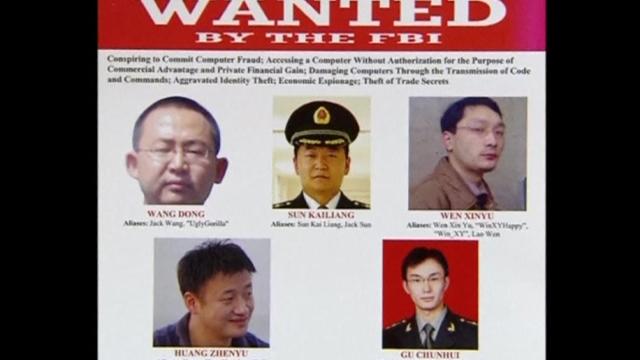
Beijing has denounced the US charges against five Chinese army officers accused of economic cyber-espionage (photo FBI)
The defense ministry added that China’s military had been the target of many online attacks, and “a fair number” of those had been launched from American IP addresses.
It said the arrest of the five Chinese army officers had “severely damaged mutual trust”.
According to a Xinhua report on Tuesday, between March and May this year, a total of 1.18 million computers in China were directly controlled by 2,077 machines in the US via Trojan horse or zombie malware.
Chinese Assistant Foreign Minister Zheng Zeguang lodged a “solemn representation” with US ambassador Max Baucus on Monday night, Xinhua reported.
On Monday US Attorney General Eric Holder said a grand jury had laid hacking charges against the Chinese nationals, the first against “known state actors for infiltrating US commercial targets by cyber means”.
Eric Holder identified the alleged victims as Westinghouse Electric, US Steel, Alcoa Inc, Allegheny Technologies, SolarWorld and the US Steelworkers Union.
“The alleged hacking appears to have been conducted for no reason other than to advantage state-owned companies and other interests in China, at the expense of businesses here in the United States,” he said.
In the indictment brought in the western district of Pennsylvania – the heart of the US steel industry – the US named Wang Dong, Sun Kailiang, Wen Xinyu, Huang Zhenyu, and Gu Chunhui, all officers in Unit 61398 of the Chinese People’s Liberation Army (PLA), as the alleged conspirators.
FBI officials said the hacking – between 2006 and 2014 – caused “significant losses” at the companies and that there were likely to be many more victims.
Last year, cyber-defense company Mandiant published a report on a Chinese military unit the firm said was behind the vast majority of significant attacks on American federal agencies and companies.
In March, Defense Secretary Chuck Hagel said the Pentagon planned to more than triple its cyber-security capabilities in the next few years to defend against such internet attacks.
[youtube Nc3gE8x3bbs 650]
China is sending five ships to evacuate its workers from Vietnam following a wave of anti-Chinese riots.
The Chinese government has already evacuated more than 3,000 people, Chinese state-run media report.
The first ship set sail on Sunday, while 16 critically injured Chinese nationals left Vietnam on a chartered flight, Xinhua news agency said.
Two Chinese workers have been killed and dozens more injured in unrest over a Chinese oil rig in disputed waters.
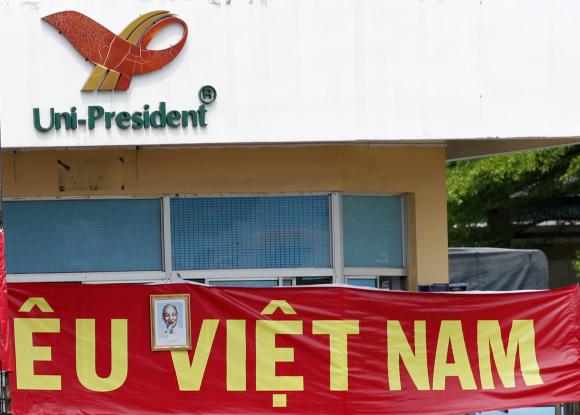
More than 3,000 Chinese workers have been evacuated from Vietnam (photo Reuters)
On Saturday the Vietnamese government called for an end to the protests.
Officials said “illegal acts” would be stopped as they could damage national stability.
However, dissident groups have urged people to rally again in major cities on Sunday and the authorities broke up some anti-China protests in Hanoi and Ho Chi Minh City.
In recent days crowds have set fire to at least 15 foreign-owned factories – including Chinese, Taiwanese and South Korean businesses – in several Vietnamese industrial parks.
Correspondents say the attacks appear to have worried authorities, as Hanoi depends heavily on foreign investment for economic growth.
However, China has urged authorities to take tougher measures to punish rioters.
“We are strongly dissatisfied by the Vietnamese side failure to respond effectively to curb an escalation,” Xinhua quoted security chief Guo Shengkun as saying on Saturday.
The protests have been triggered by China’s decision to move its Haiyang Shiyou 981 oil rig into contested waters in the South China Sea.
This led to confrontations between Vietnamese and Chinese ships earlier this month, as Vietnam sought to block the move.
China insists it will continue drilling in the area, west of the Paracel Islands – which are controlled by China but also claimed by Vietnam, and Taiwan.
Nationalist sentiment is currently running very high in Vietnam over the issue, correspondents say.
One Chinese worker is dead and at least 90 other people injured after protesters attacked a steel mill in Vietnam, amid anti-China tensions over the South China Sea dispute.
The incident took place at a Taiwanese-owned mill in Ha Tinh province.
It came a day after protesters burnt several foreign-owned factories at an industrial park.
The demonstrations have been sparked by China’s movement of a drilling rig into waters also claimed by Vietnam.
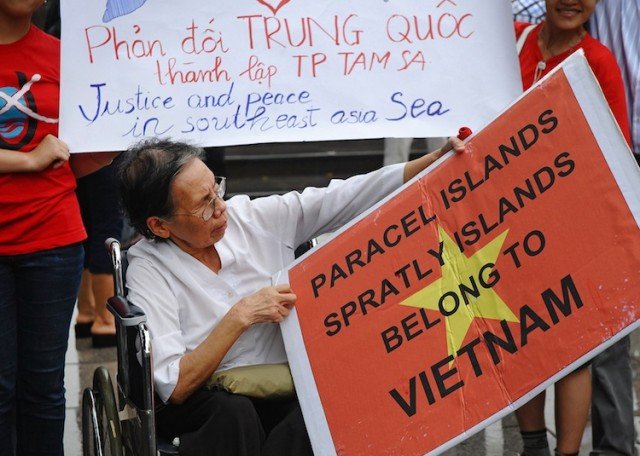
Nationalist sentiment in Vietnam is currently running very high over the South China Sea dispute (photo AFP/Getty Images)
Several anti-China protests have since taken place in Vietnam. Nationalist sentiment is currently running very high over the issue, correspondents say.
Protesters appear to have targeted businesses with Chinese characters in their signs, even if they are from other countries such as Taiwan.
The Chinese embassy in Vietnam on Thursday urged Chinese nationals to take precautions, in the second such statement in as many days.
“We once again remind all Chinese in Vietnam to take safety precautions, increase self-protection, and avoid leaving home unnecessarily,” said the statement posted on the embassy’s website.
It said that “Chinese businesses and workers have been the targets of violence” in at least seven cities or provinces across Vietnam. The embassy said it had asked Vietnamese authorities to ensure the safety of Chinese citizens.
On Tuesday, at least 15 foreign-owned factories were set on fire at industrial parks in Binh Duong province, and hundreds more attacked. No casualties were reported.
Some Taiwanese have begun leaving the country.
The latest incident happened overnight at a huge steel plant owned by Formosa Plastics Group.
Taiwan’s envoy in Vietnam said one Chinese worker was killed and 90 other people injured.
A local police official also confirmed this account.
“One Chinese worker is dead. We are trying to identify the body,” he told AFP news agency.
In a statement quoted by Reuters news agency, the company said its Vietnamese and Taiwanese workers were not attacked.
Taiwan’s envoy told AFP news agency that rioters forced Chinese workers into a corner of the factory. “The rioters have gone but we are all still concerned they might come back,” he said.
Doctors at Ha Tinh General Hospital told agencies several Chinese patients were being treated for injuries.
On Wednesday, Vietnamese authorities said at least 200 people had been arrested over the violence at the industrial park in Binh Duong.
China’s tourism body has urged its nationals to “carefully consider” any travel to Vietnam.
China’s Haiyang Shiyou 981 oil rig was brought into waters west of the disputed Paracel Islands earlier this month, leading to collisions between Vietnamese and Chinese ships as Vietnam sought to block the move.
China claims a U-shaped swathe of the South China Sea, including several areas that its South East Asian neighbors say belong to them.
In recent years it has started to enforce these claims more assertively, leading to severely strained ties with the Philippines and Vietnam in particular.
The Philippines is currently taking China to a UN court to try to resolve the issue.
[youtube 5YWTxiY8INE 650]
Anti-China protesters have set on fire several factories at an industrial park in southern Vietnam, amid tensions over the South China Sea.
The park’s management said three factories were set on fire on Tuesday, but other reports put the figure as high as 15.
No casualties have been reported but officials said many arrests were made.

Anti-China protesters have set on fire several factories at Vietnam Singapore Industrial Park (photo Reuters)
The protests came after China moved a drilling rig into waters claimed by Vietnam earlier this month.
In a daily press briefing, a Chinese Foreign Ministry spokesman said Vietnam was a “provocateur” and that Beijing had expressed concern to Hanoi.
The management of the Vietnam Singapore Industrial Park (VSIP) said that protestors gathered on Monday in Thuan An town, in the southern Binh Duong province.
On Tuesday they moved on to VSIP’s two industrial parks nearby and targeted factories owned or managed by the Chinese and Chinese expatriates.
Not all of the tenants of the three factories were Chinese companies. Some Taiwanese companies had been affected.
Other reports suggested the violence was more widespread, with more factories targeted.
A local official estimated that around 19,000 workers took part in the protest and that at least 15 factories were set on fire, according to local media.
One photo carried by Vietnamese media showed a factory had draped a South Korean flag at its entrance in a bid to stave off attacks.
Another eight were partially damaged, and had shattered windows and smashed front gates. These included buildings belonging to a Taiwan-founded shoe company.
The protest has spooked some foreign companies. Reuters reported that Hong Kong-listed sports shoe maker Yue Yuen, which supplies footwear to Adidas, Nike and other international brands, had suspended production in Vietnam.
Earlier this month, China moved its Haiyang Shiyou 981 oil rig to a spot 120 nautical miles off the coast of Vietnam.
The area is near the Paracel Islands, over which China and Vietnam have contesting claims.
The move sparked bitter protest from the Vietnamese government, which demanded an immediate pull-out.
Last week, several collisions were reported between ships from the two countries as Vietnam sought to block the installation of the rig.
Ships have also been exchanging water cannon fire and dozens of vessels are reported to be in the area.
Protests have been staged in Hanoi and Ho Chi Minh City over the past week. Vietnamese activists marched to the Chinese embassy in Hanoi on Sunday and again on Tuesday.
On Tuesday, the US warned China that its actions were “provocative”.
Beijing claims a U-shaped swathe of the South China Sea that covers areas other South East Asian nations say are their territory.
The issue has been rumbling in recent years amid an increasingly assertive stance from China over its claims.
The Philippines on Wednesday accused China of reclaiming land on a disputed South China Sea reef in order to build a new facility – possibly an airstrip or a military base.
Manila lodged a protest last month after images taken from the air showed China had been moving materials into Johnson Reef in the Spratly Islands, officials said.
Ties between Beijing and Manila have deteriorated severely in recent months because of the territorial row.
Manila is taking Beijing to an international court over the issue. It also recently signed a security deal with the US allowing more troops onto its soil, in a move seen as reflecting the difficult ties with China.
Armed police patrol vehicles have been deployed in Beijing following three attacks at transport hubs around the country.
The 150 vehicles are tasked with “countering street terrorism and fighting severe violence”, state-run Xinhua news agency said.
Petrol purchases would also be tightened, with buyers required to register with police, reports said.
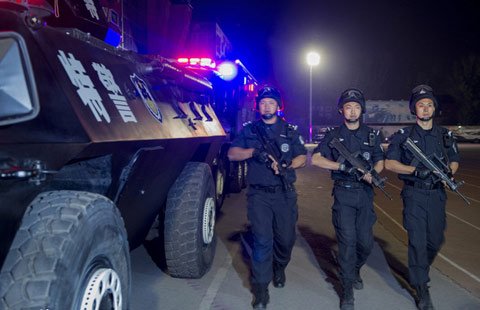
Armed police patrol vehicles have been deployed in Beijing following three attacks at transport hubs around the country
The move follows station attacks in Kunming, Urumqi and Guangzhou, and comes before the Tiananmen anniversary.
Xinhua agency said the armed police patrols would be stationed at major road junctions and manned by at least nine police officers and other assistants.
They would cover an area of 1.8 miles and would be required to respond within three minutes, Xinhua added.
Meanwhile, those buying petrol would have to explain their intentions in a move that aimed to prevent the use of gasoline “to create disturbances”, People’s Daily newspaper said.
The security upgrade comes amid heightened concern over security after the three station attacks.
March’s group knife attack in Kunming left 29 people dead and more than 100 wounded. A similar attack in Urumqi in April left three people dead and almost 80 injured.
Chinese authorities have blamed both attacks on separatists from the Muslim Uighur minority group, which lives in Xinjiang.
It is not yet clear what sparked an attack last week at Guangzhou station in which six people were hurt. One man is reported to be in custody.
In October 2013, meanwhile, five people died and dozens were injured after a car drove into a crowd near Tiananmen Square and burst into flames.
Officials said three of those who died – the occupants of the car – came from the Uighur minority group.
The Uighurs, who are ethnically Turkic Muslims, say that large-scale Han Chinese immigration into Xinjiang has eroded their traditional culture and accuse Beijing of oppressive control.
The boost in security in Beijing also comes three weeks ahead of the 25th anniversary of the crackdown on anti-government protesters at Tiananmen Square.
Several well-known activists, including journalist Gao Yu, have been detained ahead of the anniversary.
At least 39 people, including 29 police officers, have been hurt and dozens of vehicles damaged in a protest against a planned waste incinerator in Hangzhou city, Chinese state media report.
The violence broke out on Saturday in Yuhang district of Hangzhou city, in the eastern province of Zhejiang.
Local authorities say the project will not go ahead without public support.

At least 39 people, including 29 police officers, have been hurt and dozens of vehicles damaged in a protest against a planned waste incinerator in Hangzhou city (photo Reuters)
Tens of thousands of protests are held in China every year, mostly against pollution, corruption and land grabs.
Last month, state media reported that 18 people were detained after massive demonstrations against plans for a chemical plant in Maoming, in the southern province of Guangdong.
China’s citizens are increasingly conscious of the health impact of environmental pollution, with many large cities smothered in smog – a by-product of the country’s rapid industrialization and economic growth.
The state-run Xinhua news agency reports that the site for the planned waste incinerator in Yuhang was made public in April.
At the protests on Saturday, two police cars were set alight and dozens of vehicles overturned.
At least two people – a policeman and a protester – were reported to have been seriously injured.
A statement on the local government’s website, published late on Saturday, said that there would be no further work on the incinerator until the public had been consulted over the scheme.
Similar protests in other parts of China have prompted the authorities to change their plans.
[youtube krc8SUOBU-Y 650]
A cousin of Tyrannosaurus rex with a very long nose has been nicknamed Pinocchio rex.
The ferocious carnivore is 9m-long with a distinctive snout.
Its skeleton was dug up in a Chinese construction site and identified by scientists at Edinburgh University, UK.
The 66-million-year-old predator, officially named Qianzhousaurus sinensis, is described in Nature Communications.
Pinocchio looked very different to other tyrannosaurs.

Pinocchio rex is 66-million-year-old predator, officially named Qianzhousaurus sinensis (photo National Geographic)
“It had the familiar toothy grin of T. rex, but its snout was long and slender, with a row of horns on top,” said Edinburgh’s Dr. Steve Brusatte.
“It might have looked a little comical, but it would have been as deadly as any other tyrannosaur, and maybe even a little faster and stealthier.
“We thought it needed a nickname, and the long snout made us think of Pinocchio’s long nose.”
Researchers now think several different tyrannosaurs lived and hunted alongside each other in Asia during the late Cretaceous Period, the last days of the dinosaurs.
The enormous Tarbosaurus (up to 13 m) had deep and powerful jaws like T. rex – strong enough to crush the bones of giant herbivores.
The thinner teeth and lighter skeleton of Qianzhousaurus suggest it hunted smaller creatures, such as lizards and feathered dinosaurs. But at 9 m tall and weighing almost a tonne, it was still a gigantic carnivore.
Pinocchio’s snout was 35% longer than other dinosaurs of its size.
The discovery of “Pinocchio” settles an argument over a series of strange new fossil finds.
Paleontologists are now confident that Qianzhousaurus and Alioramus are part of a new subgroup of tyrannosaurs with elongated skulls.
Their discovery from Mongolia to southern China suggests these “second tier” carnivores were widely distributed, according to Prof Junchang Lu of the Chinese Academy of Geological Sciences, a co-author on the paper.
With these “weird” creatures now accepted as being part of a whole family, more and more of their long-snouted relatives are expected to be unearthed.
As for the riddle of Pinocchio’s nose, the scientists hope to solve it via biomechanical studies of its jaw – which may hint at its feeding habits.
[youtube 3d_h8WyYMR4 650]
An illegal bridge has collapsed in southern China, killing 11 people, state media and officials say.
The stone arch bridge was being constructed illegally at a village in Gaozhou City, Guangdong province, the officials said.
It collapsed on Saturday, killing five people instantly, while six died later in hospital.
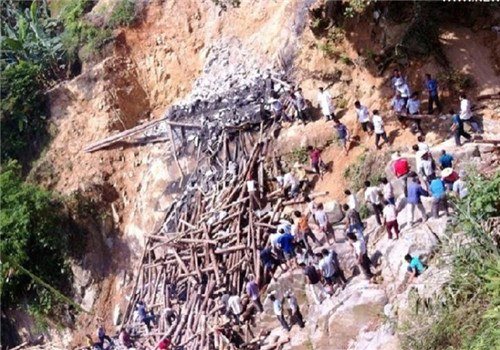
The stone arch bridge was being constructed illegally at a village in Gaozhou City
Authorities are investigating the incident. The contractor has been arrested, state media report.
The bridge was being built in Liangkengkou village in Gaozhou.
Twenty-six people were trapped under the bridge when it collapsed, officials said.
Survivors were taken to hospital after being pulled from the rubble.
Government officials said the village had been ordered to stop building the bridge several times.
However, the village secretly restarted construction over the May Day holiday, which ran from Thursday to Saturday, they added.
[youtube BeDSkhtiZWo 650]
China’s Urumqi railway station in western Xinjiang region has been hit by an explosion, injuring a number of people, state media report.
The blast hit Urumqi’s south railway station on Wednesday evening, state media said. The cause is not clear, but one report said at least 50 were hurt.
Xinjiang has experienced several violent clashes over the past months.
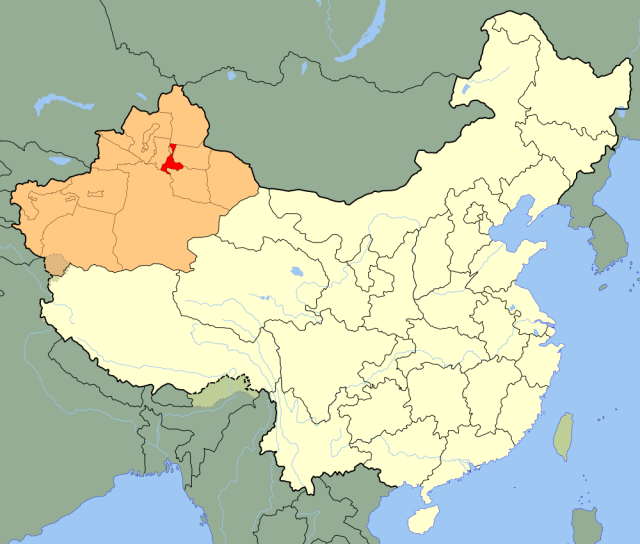
China’s Urumqi railway station in western Xinjiang region has been hit by an explosion, injuring a number of people
President Xi Jinping visited the region this week, and has promised to step up anti-terrorism efforts.
Verifying reports from the region is difficult because the information flow out of Xinjiang is tightly controlled.
“A blast occurred at Xinjiang’s Urumqi train station at around 19.00 tonight, and there are injured personnel,” state-run newspaper People’s Daily said on its verified microblog feed.
Meanwhile, The Beijing News said at least 50 people had been injured, citing police officers.
Photos on social media, which could not be independently verified, appeared to show suitcases and debris strewn across a street after the blast.
However, several microblog posts and photos related to the explosion appeared to have been quickly deleted from Sina Weibo, China’s largest microblog platform.
[youtube TTa8aTDUPPQ 650]
After talks with PM Shinzo Abe, President Barack Obama has reaffirmed his support for Japan in its row over islands with China.
Barack Obama, who is on a four-nation Asia tour, warned against escalation in the dispute and said he wanted to see the row resolved peacefully.
He confirmed that the islands fell under a security treaty that commits the US to act if Japan is attacked.
Barack Obama and Shinzo Abe also discussed a major trade deal as well as North Korea.
The US president arrived in Japan late on Wednesday ahead of stops in South Korea, Malaysia and the Philippines.
He is not going to Beijing but relations with China are expected to dominate his meetings with regional leaders.
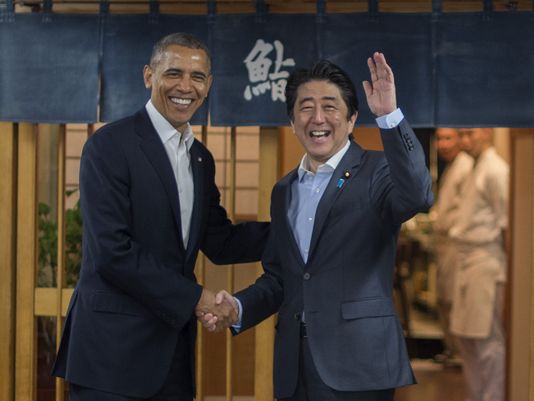
After talks with PM Shinzo Abe, President Barack Obama has reaffirmed his support for Japan in its row over islands with China
Barack Obama’s trip – which ends on April 29 – comes nearly seven months after he cancelled a visit to the region because of a US government shutdown.
Officials say it is aimed at reassuring America’s Asian allies of its commitment to the region amid concern over China’s growing power.
On Wednesday Barack Obama had an informal dinner with Shinzo Abe. The two leaders then held talks on Thursday morning and gave a joint press conference.
“Article five [of the US-Japan security treaty] covers all territories under Japan’s administration including [the] Senkaku islands,” Barack Obama said, echoing comments published in Wednesday’s Yomiuri newspaper.
“We do not believe that they should be subject to change unilaterally.”
“This is not a new position. This is a consistent one,” he said.
However, Barack Obama also said he told Shinzo Abe that it “would be a profound mistake to continue to see escalation around this issue instead of dialogue”.
The islands are called Senkaku in Japan and Diaoyu in China.
Japan controls the islands but China has been strongly pressing its claim in recent months, flying and sailing vessels in and out of what Japan says are its waters and airspace.
Japan depends on the US for its security, under a decades-old alliance that dates back to the end of World War Two. If Japan is attacked, the US is obliged to come to its aid.
China’s foreign ministry said on Wednesday that it opposed the US stance.
“The so-called US-Japan alliance is a bilateral arrangement from the Cold War and ought not to harm China’s territorial sovereignty and reasonable rights,” spokesman Qin Gang said in Beijing.
Shinzo Abe and Barack Obama also discussed the Trans-Pacific Partnership, a giant trade deal involving 12 nations.
It is currently stalled partly due to a row between the US and Japan over agricultural tariffs.
North Korea was also on the agenda. Barack Obama wants Tokyo and Seoul to work together on the issue, but ties between the two remain badly strained because of war-related historical issues.
Barack Obama flies to Seoul after Tokyo, amid reports of increased activity at Pyongyang’s nuclear test site – potentially suggesting a fourth nuclear test could be imminent.
[youtube mQ-2P7d91f0 650]
China National Petroleum Corporation – the country’s biggest oil company – has been blamed for water contamination affecting over 2.4 million people in Lanzhou.
State media said Lanzhou’s environmental protection chief, Yan Zijiang, blamed it on a leak from a pipeline owned by a subsidiary of China National Petroleum Corporation (CNPC).
The pipeline is now being repaired.
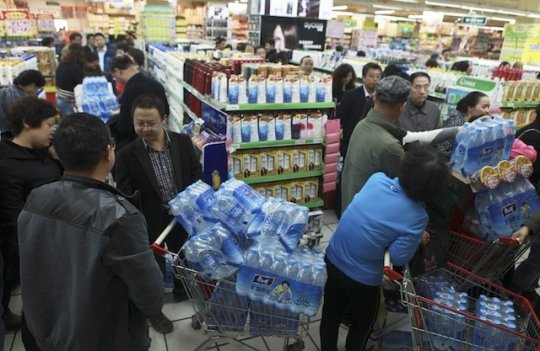
China National Petroleum Corporation has been blamed for water contamination affecting over 2.4 million people in Lanzhou
Lanzhou is the capital of north western Gansu province.
Lanzhou Petrochemical Co., is the subsidiary of state-owned CNPC believed to own the affected pipeline.
The leak tainted source water for a plant owned by Veolia Water, a joint Sino-French venture and the sole supplier for urban Lanzhou, reported state news agency Xinhua.
It added that authorities have warned that tap water contained up to 200 micrograms per litre of the toxic chemical benzene – 20 times the national safety limit.
The authorities have since said the contamination has returned to safe levels in most areas.
Exposure to benzene, often used in the petrochemical industry, can increase the risk of cancer and other diseases.
Shops are said to have sold out of bottled water.
The scare has once again raised concerns over China’s environmental safety record.
US Defense Secretary Chuck Hagel has toured the Liaoning – China’s first aircraft carrier – at the beginning of a three-day visit to the country.
Chuck Hagel, who arrived in the port of Qingdao from Japan, is thought to be the first senior Western official to board the vessel.
China bought it from Ukraine in 1998 and has spent 10 years refitting it.
It is seen as a potent symbol of China’s ambition to modernize its navy, amid a strategic shift in the region.
The fact that Chuck Hagel was allowed to step on board the carrier will be seen as a sign that the two countries may be willing to engage in more military co-operation.
Washington has repeatedly called for more transparency from Beijing on its military spending.
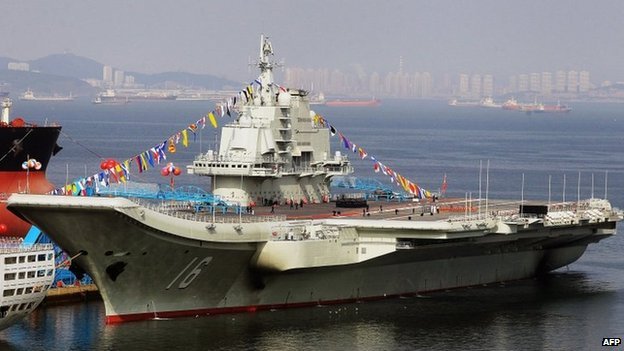
Chuck Hagel has toured the Liaoning – China’s first aircraft carrier – at the beginning of a three-day visit to the country (photo AFP)
US officials said that Chuck Hagel’s visit to the Liaoning at Yuchi naval base – which took place after a US request – lasted about two hours.
No further details were immediately available and journalists accompanying him on the China visit did not go with him.
The carrier was built in the 1980s for the Soviet navy but was never completed.
When the Soviet Union collapsed in 1991, the rusting hull – then called the Varyag – sat in dockyards in Ukraine.
A Chinese company with links to China’s People’s Liberation Army (PLA) then bought the Varyag, saying it wanted to turn the vessel into a floating casino in Macau.
In 2001, the ship was towed to China. The Chinese military confirmed in June 2011 that it was being refitted to serve as the nation’s first aircraft carrier.
Earlier this year, it completed sea trials in the South China Sea, where China has overlapping territorial claims with several South East Asian nations.
Beijing’s more assertive stance on this issue in recent years has led to a rise in tensions between China and its neighbors, particularly Vietnam and the Philippines.
China is also embroiled in a separate dispute over East China Sea islands that are controlled by Japan.
In Tokyo, Chuck Hagel addressed regional territorial disputes, saying Chinese authorities should have “respect for their neighbors”.
“You cannot… redefine boundaries and violate territorial integrity and sovereignty of nations by force, coercion and intimidation, whether it’s in small islands in the Pacific or large nations in Europe,” he said.
The Liaoning aircraft carrier has already attracted controversy. Late last year, Chuck Hagel criticized China as “irresponsible” after the near-collision of a US warship and a Chinese naval vessel in the South China Sea.
The US said its guided missile cruiser, USS Cowpens, was operating in international waters on December 5 when the Chinese vessel – which was accompanying the Liaoning – forced it to take evasive action.
Former Chinese General Gu Junshan has been charged with corruption, misuse of state funds and abuse of power, state media report.
Gu Junshan, who was deputy logistics chief in China’s army, is the most senior officer to be tried at a military court since 2006, reports said.
He was removed from his post in 2012 and has been under investigation since.
China’s President Xi Jinping has vowed to crack down on corruption at all levels of the Communist Party.
“Gu Junshan has been charged on suspicion of corruption, bribery, embezzlement and abuse of power,” state-run news agency Xinhua reported on Monday, adding that he would be prosecuted in a military court.
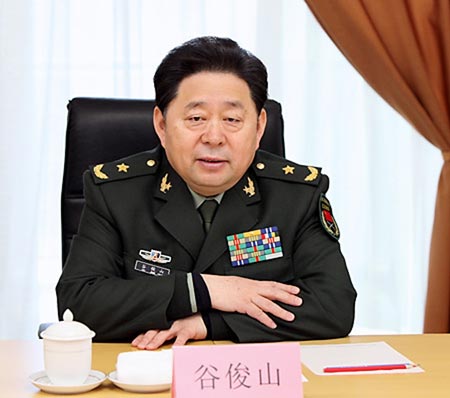
Former Chinese General Gu Junshan has been charged with corruption, misuse of state funds and abuse of power
Correspondents say it is extremely rare for senior military figures to be tried in this way, and a guilty verdict is almost guaranteed.
Chinese investigative magazine Caixin has reported on Gen. Gu Junshan’s apparently lavish lifestyle. The magazine said he owned several properties, including a home in Henan province modeled on China’s former imperial palace with several gold art pieces or statues.
Gen Gu Junshan’s patron Xu Caihou, the powerful former vice-chairman of the Central Military Commission, has also been detained and is under investigation, South China Morning Post, Reuters, and the New York Times reported.
Since being confirmed as China’s leader in late 2012, Xi Jinping has called for a crackdown on corruption, vowing to tackle it from the powerful “tigers” at the top to the “flies” at the bottom of the Communist Party.
Several high-profile government officials have been investigated and tried for corruption over the past year.
However, China has also put several prominent anti-corruption activists on trial, a move that human rights groups have described as hypocritical.
Xi Jinping will arrive in the Netherlands later today for his first trip to Europe as China’s president.
President Xi Jinping’s tour will include France, Germany and Belgium as well as the headquarters of the EU in Brussels.
A 200-strong business delegation will join him on a trip that is expected to be dominated by trade – possibly including an order for 150 Airbus jets.
Xi Jinping is also likely to face pressure from Western powers to be firmer with Russia over its actions in Ukraine.
China usually supports Russia in foreign-policy issues, but last week declined to fully back its ally over Ukraine.
Beijing abstained from a vote at the UN that would have condemned Russia’s takeover of Ukraine’s Crimea region.

Xi Jinping will arrive in the Netherlands later today for his first trip to Europe as China’s president (photo Reuters)
A tit-for-tat trade dispute, with China targeting French wine after the EU imposed tariffs on Chinese solar panels, was only resolved on Friday.
Xi Jinping will be welcomed by Dutch King Willem-Alexander and Queen Maxima at the start of his state visit to the Netherlands.
He arrives in advance of a G7 meeting on the sidelines of the Nuclear Security Summit (NSS) in The Hague next week.
Xi Jinping is expected to discuss the situation in Ukraine with President Barack Obama on the sidelines of the summit.
Correspondents say the Chinese president is likely to repeat Beijing’s call for “calm and restraint” in the crisis.
The Chinese leader will also meet French President Francois Hollande and German Chancellor Angela Merkel on his trip, which ends in Belgium on April 1.
One side issue of note from the visit comes from reports in the German press suggesting that the Chinese delegation had asked for an official visit, accompanied by Chancellor Angela Merkel, to a Holocaust memorial.
Berlin is said to have refused, fearing that it would be used by China as propaganda to highlight its complaint that Japan has not done enough to atone for its militaristic past.
Der Spiegel reports that the Chinese delegation has been told that President Xi Jinping is free to visit memorials in his own time.
[youtube efBruBxyDMc 650]
China has started searching its territory for missing Malaysia Airlines flight MH370, while Australia has narrowed its search area in the south.
Efforts to find the aircraft are focusing on two vast air corridors north and south of the plane’s last known location.
China said no evidence of terror links had been found in Chinese passengers.
The Malaysia Airlines plane went missing on March 8 with 239 people on board. Some 26 countries are involved in search efforts.
Malaysia says the plane was intentionally diverted and could have flown on either a northern or southern arc from its last known position in the Malacca Straits.
Search efforts are focused on two corridors – one stretching from the border of Kazakhstan and Turkmenistan to northern Thailand, and another from Indonesia to the Indian Ocean.
Investigators are looking into the possibility that the aircraft’s crew – or other individuals on the plane – were involved in its disappearance.
A total of 153 Chinese nationals were on board the missing aircraft, which was flying from Kuala Lumpur to Beijing.

China has started searching its territory for missing Malaysia Airlines flight MH370
Chinese Ambassador to Malaysia, Huang Huikang, said that search and rescue operations in the Chinese territories of the northern corridor had begun, Xinhua news agency reported.
Based on background checks, there was no evidence to suggest that the mainland Chinese passengers on the plane were involved in hijacking or launching a terror attack, Mr Huang added.
China said it had also deployed 21 satellites to help with the search.
Meanwhile, the Australian Maritime Safety Authority (AMSA) said it had narrowed down its search area in the southern Indian Ocean based on satellite data and analysis of the aircraft’s possible movements.
However, AMSA said the search area was still vast.
“A needle in a haystack remains a good analogy,” AMSA Emergency Response General Manager John Young said, adding that there was a “difficult” task ahead.
“The sheer size of the search area poses a huge challenge – the search area is more than 600,000 square kilometres [230,000 sq miles],” he added.
Late on Monday, US officials said the US navy ship USS Kidd had been taken off the search because the enlarged search area meant that “long-range patrol aircraft” were “more suited” to the mission.
The move was made “in consultation with the Malaysian government”, officials said in a statement. USS Kidd had searched the Andaman Sea but found “no debris or wreckage associated with an aircraft”, they added.
The US says it is using patrol aircraft including the P-8A Poseidon and P-3C Orion to continue search efforts, with the P-8 taking part in search efforts in the south corridor.
The Malaysia Airlines plane left Kuala Lumpur at 00:40 local time on March 8. The last transmission from the plane’s Aircraft and Communications Addressing and Reporting System (ACARS) was received at 01:07.
A transmission expected 30 minutes later did not come through, Malaysia Airlines Chief Executive Ahmad Jauhari Yahy told reporters. Officials believe the communications systems were deliberately disabled.
Several countries have already rejected the suggestion that their airspace might have been breached.
[youtube WvTKrp2-cCQ 650]
A Chinese government website has released satellite images of possible debris from the missing Malaysia Airlines flight MH370.
The three images show what appear to be large, floating objects in the South China Sea. Previous sightings of possible debris have proved fruitless.
Malaysia Airlines plane went missing on Friday with 239 people on board.
The aircraft vanished about an hour after it took off from Kuala Lumpur as it flew south of Vietnam’s Ca Mau peninsula.
No distress signal or message was sent.
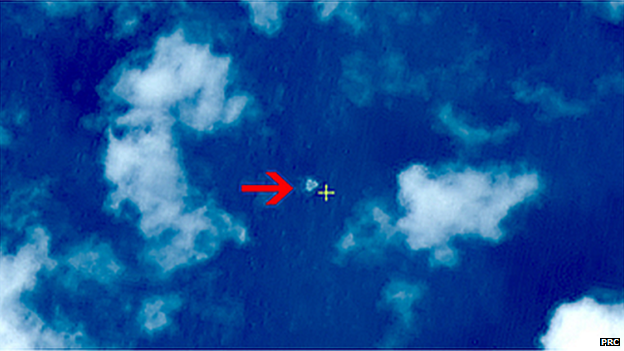
China has released satellite images of possible debris from the missing Malaysia Airlines flight MH370 (photo PRC)
The three images were taken on Sunday, a day after the plane disappeared, but were only released on Wednesday on the website of China’s State Administration for Science.
Map co-ordinates place the objects in the South China Sea east of Malaysia and off the southern tip of Vietnam.
China’s official Xinhua news agency says the largest of the objects measures about 24m x 22m (78ft x 72ft).
China has deployed several high-resolution satellites – controlled from the Xian Satellite Control Centre in northern China – to help search for the jet, the People’s Liberation Army said on Tuesday.
Earlier, Malaysian authorities revealed that the last communication from the jet suggested everything was normal on board.
[youtube _qxpbzY8B_E 650]
Malaysian authorities have been urged by China to “step up its efforts” in the search for the missing Malaysia Airlines jet that disappeared on Saturday.
Most of the passengers on board of flight MH370 were Chinese nationals.
Nearly three days after the aircraft went missing, an international effort has still not found the plane’s wreckage.
None of the debris and oil slicks spotted in the water so far have proven to be linked to the disappearance.
Flight MH370 vanished from radar almost three days ago en route to Beijing from Kuala Lumpur, with 239 people on board.
Relatives of the missing passengers have been told to prepare for the worst.
China said the Malaysian authorities needed to “step up their efforts” to find the missing airliner, which had more than 150 Chinese nationals on board.
“We … have a responsibility to demand and urge the Malaysian side to step i[ search efforts, start an investigation as soon as possible and provide relevant information to China correctly and in a timely manner,” said Chinese foreign ministry spokesman Qin Gang.
Earlier, the Global Times, a prominent Communist Party newspaper, issued a sharply worded editorial arguing there were “loopholes” in the work of Malaysian airlines and security authorities, noting that “until yesterday [Sunday], the Malaysian government could not even ensure accurate information about the [plane’s] passengers”.
The Malaysian authorities are attempting to address Chinese concerns – they have reissued a pledge to fly worried family members to Kuala Lumpur so they can be closer to the search efforts, our correspondent adds.
But one victim’s relative – Guo Qishun, whose son-in-law was on the plane – said he did not see the point of flying to Malaysia.
“We don’t want to go to Malaysia now. There is no result from the search operation yet. If we go to Malaysia, we can do nothing but wait, just like what we are doing in Beijing now. If we go to Malaysia, who can we rely on? Most of us don’t speak English,” he told the Associated Press news agency.
Malaysian authorities have identified one of the two men travelling on the missing plane on stolen passports.
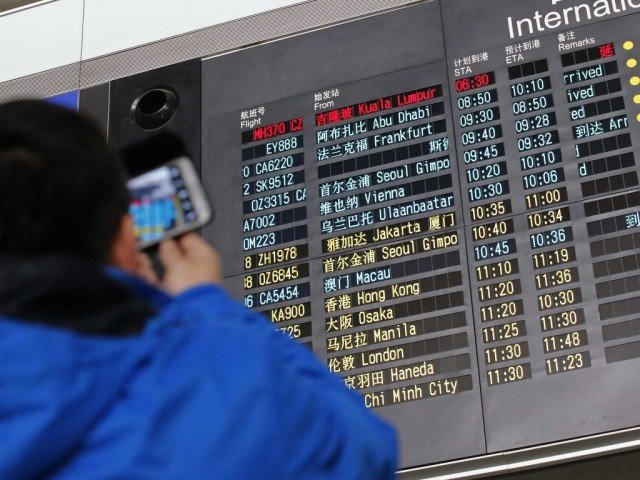
Flight MH370 vanished from radar almost three days ago en route to Beijing from Kuala Lumpur
Police chief Khalid Abu Bakar said they could not reveal his identity, but confirmed the man was a non-Malaysian.
Malaysia’s acting transport minister, Hishamuddin Hussein, said all of the relevant information concerning those two passengers had now been passed on to the various national intelligence agencies which were investigating the matter.
International police agency Interpol has confirmed the passengers were travelling with Italian and Austrian passports stolen in Thailand years ago.
The search area has been widened to include waters in the Strait of Malacca.
Commander William Marks from the US Seventh Fleet, which is taking part in the search, says he expects the plane’s flight recorders to be floating in the water.
“In calm seas, if there were a soccer ball [football] or a basketball floating in the water, the radar could pick it up. They [flight recorders] typically have a radio beacon and so for example our P3 [radar] – if they are flying within a certain range of that – will pick up that radio beacon. We have not yet picked up anything, but that’s typically what those black boxes contain.”
There are now 40 ships and 34 aircraft from nine different nations taking part in the search in the seas off Vietnam and Malaysia.
US Navy officials earlier said their aircraft had not seen any debris associated with commercial aircraft wreckage.
Flight MH370 left Kuala Lumpur for Beijing at 00:41 local time on Saturday. But radio contact was lost at 01:30, somewhere between Malaysia and Vietnam.
Officials say they still have no idea what went wrong.
Malaysian military officials said on Sunday they were widening the search area because of indications the plane, a Boeing 777-200ER, may have turned back from its scheduled route shortly before vanishing from radar screens.
Investigators are looking at all angles, including a possible terror attack. Counter-terrorism agencies and the FBI are involved in the operation.
Five passengers booked on the flight did not board, and their luggage was consequently removed.
The passengers on the flight were of 14 different nationalities. Two-thirds were from China, while others were from elsewhere in Asia, North America and Europe.
Malaysia Airlines is the country’s national carrier, flying nearly 37,000 passengers daily to some 80 destinations worldwide.
On Monday, shares in Malaysia Airlines fell 18% to a record low.
[youtube NI-pNI_elf4 650]
[youtube LyXeF_Z6nN8 650]
At the opening of its annual parliament session, China has announced a growth target of 7.5% and plans to raise its defense budget by 12.2%.
China’s PM Li Keqiang said that economic development was the central task of the government, but “painful structural adjustments” were needed.
Japan voiced concern at the defense move, citing a “lack of transparency”.
Li Keqiang also pledged to “declare war” on pollution, fight corruption “without mercy”, and “crack down” on terrorism.
The congress marks one year since Xi Jinping was confirmed as president.
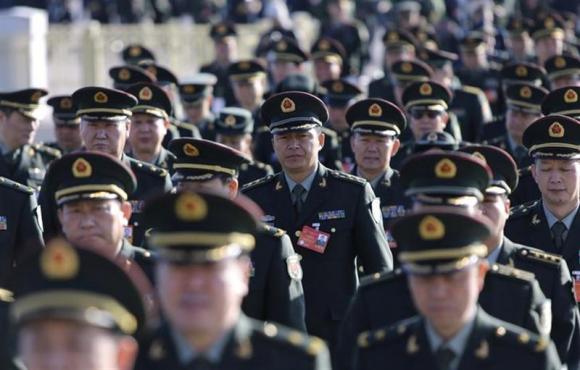
China revealed plans to raise its defense budget by 12.2 percent (photo Reuters)
The 10-day meeting of around 3,000 legislators from delegations across China began on Wednesday.
As parliament opened PM Li Keqiang presented a work report highlighting targets for China’s economy this year.
He said that the government’s “work got off to a good start” but admitted that “there are still many problems that people are unhappy about”.
According to the speech, the government will aim to keep inflation at about 3.5%, while boosting domestic growth and carrying out “people-centred urbanization”.
The growth and inflation targets were widely expected. The growth rate target in 2013 was also 7.5%.
Correspondents say the fact that the growth target for 2014 has not changed will lead some to question how serious China is about embracing economic reforms, which would involve lowering the growth rate.
Implementing reforms to tackle local government debt was also expected to be a priority.
The latest military budget boost comes amid tensions between China and many of its neighbors, including Japan and the Philippines, over disputed territories.
[youtube KkSjSsy-lsA 650]
Chinese police captured three suspects involved in Saturday’s deadly mass knife attack at Kunming railway station, state media report.
Several men and women burst into the south-western city’s railway station stabbing people at random, leaving 29 dead and wounding more than 130.
Officials have blamed separatists from the Xinjiang region for the attack.
Four attackers were shot dead by police at the scene, officials say. An injured female suspect was reportedly detained.
Citing a statement from the Ministry of Public Security, Xinhua news agency said six men and two women, led by a person identified as Abdurehim Kurban, were responsible for the attack.
There were no details about how the suspects were identified and captured.
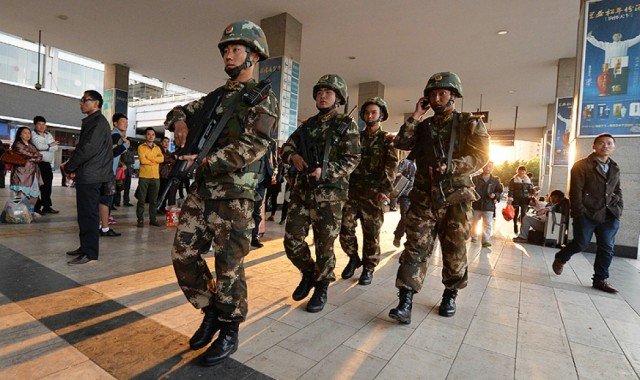
Chinese police captured three suspects involved in Saturday’s deadly mass knife attack at Kunming railway station
Officials say that evidence, such as insignia recovered from the station about “East Turkestan”, points to the involvement of separatists from Xinjiang – a region in the far west of China bordering Central Asia.
China’s security chief, Meng Jianzhu, has vowed “all-out efforts” to “severely punish terrorists”.
Eyewitnesses described horrific scenes on Saturday, saying that in just 12 minutes attackers used curved swords and meat cleavers to stab people at random as they rampaged through the station.
A memorial for the victims has been set up at Kunming station’s concourse
Kunming is the capital of China’s Yunnan province. On Monday, security was tight, with a heavy police presence at Kunming station and surrounding areas.
Xinjiang is home to the Muslim Uighur minority group. Recent months have seen several violent incidents there which the government has blamed on extremists. Verifying these reports is difficult because foreign journalists’ access to the region is tightly controlled.
China is often accused of exaggerating the threat of Islamist terrorism to justify its harsh security crackdown in Xinjiang and the restrictions it places on the religion and culture of the Uighurs.
[youtube L8FKOLlcWsY 650]
Chinese separatists Uighur Muslims from the north-western Xinjiang region are blamed for the mass knife attack at Kunming railway station that left 29 people dead and at least 130 wounded, officials said.
A group of attackers, dressed in black, burst into the station in the south-west city of Kunming and began stabbing people at random.
Images from the scene posted online showed bodies lying in pools of blood.
State news agency Xinhua said police shot at least four suspects dead.
A female suspect was arrested and is being treated in hospital for unspecified injuries while a search continues for others who fled the scene.
Authorities described the incident as an “organized, premeditated, violent terrorist attack”.
The Kunming city government later said that evidence from the scene pointed to separatists from Xinjiang as being behind the attack.
It gave no details and the claim could not be verified.
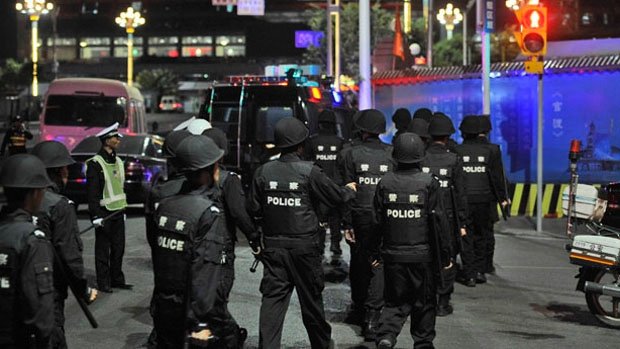
Chinese separatists Uighur Muslims are blamed for the mass knife attack at Kunming railway station
Some of Xinjiang’s minority Uighur Muslims want autonomy from Chinese rule and an end to state suppression of their religion.
Witnesses in Kunming said those who couldn’t run quickly were cut down by the attackers’ knives.
A survivor named Yang Haifei, who was wounded in the back and chest, told Xinhua he had been buying a train ticket when the attackers rushed into the station.
“I saw a person come straight at me with a long knife and I ran away with everyone,” he said.
First reports said the attackers were only men, but witnesses and police later said the group also included women.
Chinese President Xi Jinping and PM Li Keqiang sent condolences to the victims and their families.
President Xi Jinping urged “all-out efforts” to investigate the attack.
“Severely punish in accordance with the law the violent terrorists and resolutely crack down on those who have been swollen with arrogance,” Xinhua quoted the president as saying.
The incident comes a few days before the opening of China’s annual parliamentary session, the National People’s Congress.
[youtube 0IfTBtLwuYs 650]
At least 27 people died in a knife attack at a train station in Kunming, south-west China, the state news agency Xinhua says.
Nothing is known so far about the motivation behind the attack, in which 109 people are said to have been hurt.
Xinhua gave few further details, and the men responsible have not been identified.
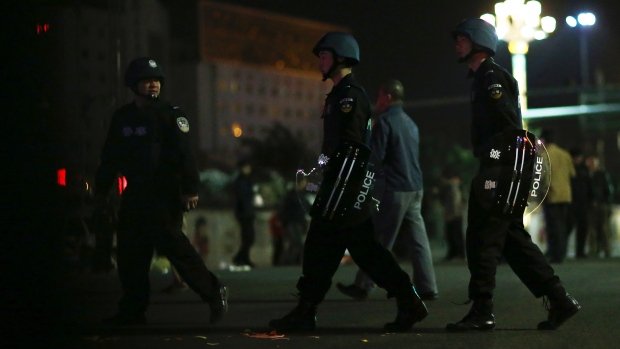
At least 27 people died in the knife attack at Kunming train station
A local television station said several of the attackers had been shot by police, according to Associated Press.
Chinese state television described the incident as a “violent terror attack”.
Eyewitnesses said that the men started attacking people at random.
Social media users in China have been posting pictures of the attack on the internet, but correspondents say they are being taken down.
Mass stabbings are not uncommon in China, but none have been recently reported on this scale.
[youtube c1u50_BWSTo 650]
President Barack Obama has met exiled Tibetan spiritual leader the Dalai Lama at the White House, US officials say.
Barack Obma vowed “strong support” for the protection of Tibetans’ human rights in China during the encounter with the Dalai Lama.
China had urged the US to cancel the meeting, saying it would “seriously impair China-US relations”.
Beijing described the Dalai Lama as a separatist, while the spiritual leader said he only advocates greater autonomy for Tibet, not independence.
During their meeting in the White House Map Room, Barack Obama and the Dalai Lama reportedly said they hoped talks would resume between Beijing and the Tibetan spiritual leader’s representatives.
The two men last met in 2011, in talks that angered China. Tibet is governed as an autonomous region in China.
China has been widely accused of repressing political and religious freedoms in Tibet. Beijing rejects this and says economic development has improved Tibetans’ lives.
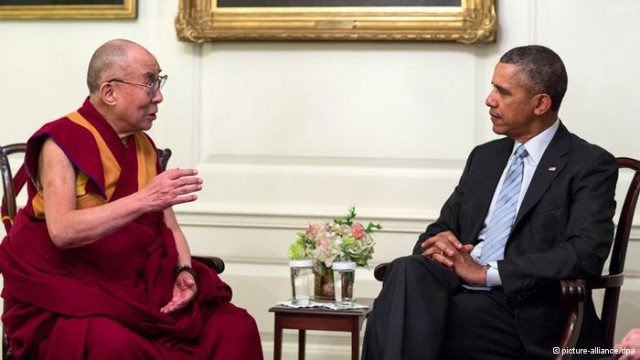
Barack Obma vowed “strong support” for the protection of Tibetans’ human rights in China during the encounter with the Dalai Lama
China’s response to the meeting was swift, with the country’s Vice-Foreign Minister Zhang Yesui summoning US charge d’affaires Daniel Kritenbrink to protest against the encounter.
“China expresses strong indignation and firm opposition,” Zhang Yesui said, according to the Xinhua news agency.
“The Tibetan issue is the domestic affair of China, and the United States bears no right to interfere,” he added.
“Such a move will gravely sabotage China-US co-operation and relations, and will definitely undermine its own interests.”
Caitlin Hayden, a spokeswoman for the National Security Council, earlier said President Barack Obama met the Dalai Lama “in his capacity as an internationally respected religious and cultural leader”.
“We do not support Tibetan independence,” she said, adding that the US “strongly supports human rights and religious freedom in China.
“We are concerned about continuing tensions and the deteriorating human rights situation in Tibetan areas of China.”
In recent years more than 110 ethnic Tibetans – mostly young monks and nuns living in areas outside Tibet – have set themselves on fire in apparent protest against Beijing’s rule.
China’s government accuses the Dalai Lama of orchestrating the protests, a charge he strongly rejects.
The Dalai Lama fled to India in 1959, after Chinese troops crushed an attempted uprising in Tibet.
[youtube RXNm7OTzYGg 650]
According to recent figures, China’s trade surplus jumped to $31.9 billion in January, easing concerns the world’s second-largest economy may be stuck in a slowdown.
The figure was up 14% from a year earlier and stronger than forecasts for a $23.7 billion surplus.
Imports rose by 10% from a year earlier to $175.27 billion – led by record shipments of crude oil, iron ore and copper.
Exports increased by 10.6% from a year earlier, far faster than analysts’ forecasts, to $207.13 billion.
The positive trade figures also add to expectations China will overtake the US as the world’s largest trading nation this year.
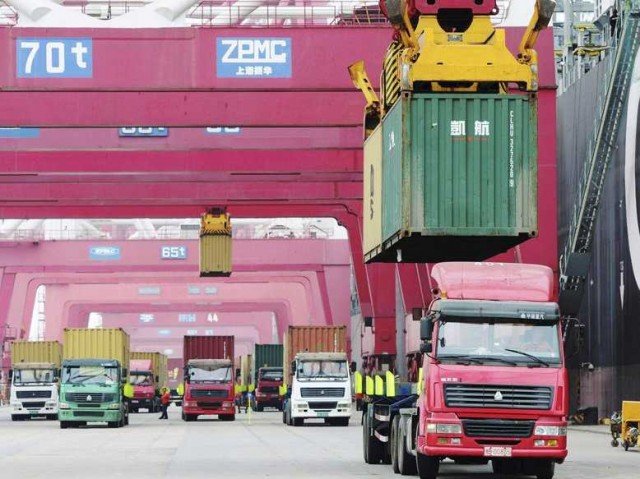
China’s trade surplus jumped to $31.9 billion in January, easing concerns the world’s second-largest economy may be stuck in a slowdown
China is the world’s largest exporter, and analysts had been expecting the data to reflect effects of the Lunar New Year holiday, which fell in January this year.
During this period, factories and offices on the mainland tend to shut for long periods for workers to mark China’s biggest annual holiday.
Investors have been watching economic releases out of China closely as its growth affects the health of export-oriented countries such as Singapore and Australia.
China is expected to post its slowest growth in over a decade this year, which is likely to have a knock-on effect across the region.
Last month, financial markets nosedived after surveys of its manufacturing and services sectors indicated a slowdown in the economy.
[youtube 8MtAwKjEwNE 650]
Prominent human rights activist Xu Zhiyong has been sentenced to four years in prison, a Chinese court has ruled.
Xu Zhiyong, who campaigned for children’s rights and against corruption, was convicted of “gathering crowds to disrupt public order”.
Several other activists from a transparency movement are facing similar charges.
Rights groups have criticized President Xi Jinping – who pledged to fight corruption – over their cases.
Xu Zhiyong was arrested in July 2013 and the trial began on Wednesday.
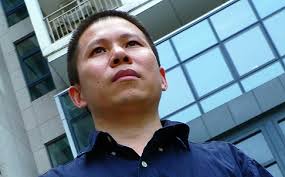
Human rights activist Xu Zhiyong has been sentenced to four years in prison
Reacting to the verdict, Xu Zhiyong ‘s lawyer Zhang Qingfang said his client had told the court that “the last shred of dignity of China’s rule of law” had been destroyed.
Xu Zhiyong, who was also previously under house arrest, is a leading member of a group calling for officials to reveal their wealth.
The activist has also campaigned in behalf of inmates on death row and families affected by tainted baby milk formula, among other causes.
Many across China believe Xu Zhiyong was targeted by the government because of his rising popularity and his growing presence on Chinese social media platforms.
In 2009 Xu Zhiyong was arrested on tax evasion charges that were eventually dropped after public outcry.
[youtube K1YV9r6fCXc 650]
According to the World Health Organization, a surge in cases of the deadly new strain of bird flu has been reported in China at the beginning of 2014.
Only a handful of people had been infected with H7N9 since June, but health officials have reported 73 cases so far this month.
Influenza researchers argue the winter season and preparations for Chinese New Year may be driving the increase.
The WHO called for vigilance, saying the virus was likely to remain present for some time.
H7N9 made the jump from infecting domestic chickens and ducks to infecting people at the end of March 2013.
Within a month, 126 cases and 24 deaths had been recorded.
The virus was stopped in its tracks as control measures, such as closing live poultry markets, were introduced.

Influenza researchers argue the winter season and preparations for Chinese New Year may be driving the increase of bird flu cases
There were just five cases between June and November.
The recent jump takes the total number of cases to 219, including 55 deaths.
Apart from a couple of cases in close family clusters, the virus has not been able to spread from person to person.
Gregory Hartl, spokesman for the WHO, said flu viruses circulated more easily during the colder winter months.
“Our calculation was always that we were going to have to watch the winter, and that’s where we are at the moment.
“We need to remain vigilant, but so far the virus does not seem to have mutated in any way,” he says.
“Some people will be looking very closely at the Chinese New Year, when there will be lots of people travelling.
“It will be crowded on trains and they’ll also be travelling with chickens.”
The H7N9 virus itself, however, does not appear to have mutated in a way that could make it more likely to spread around the globe.
[youtube FRvy3VcalKM 650]
 Prev1...456...8Next
Prev1...456...8Next  Page 5 of 8
Page 5 of 8

























